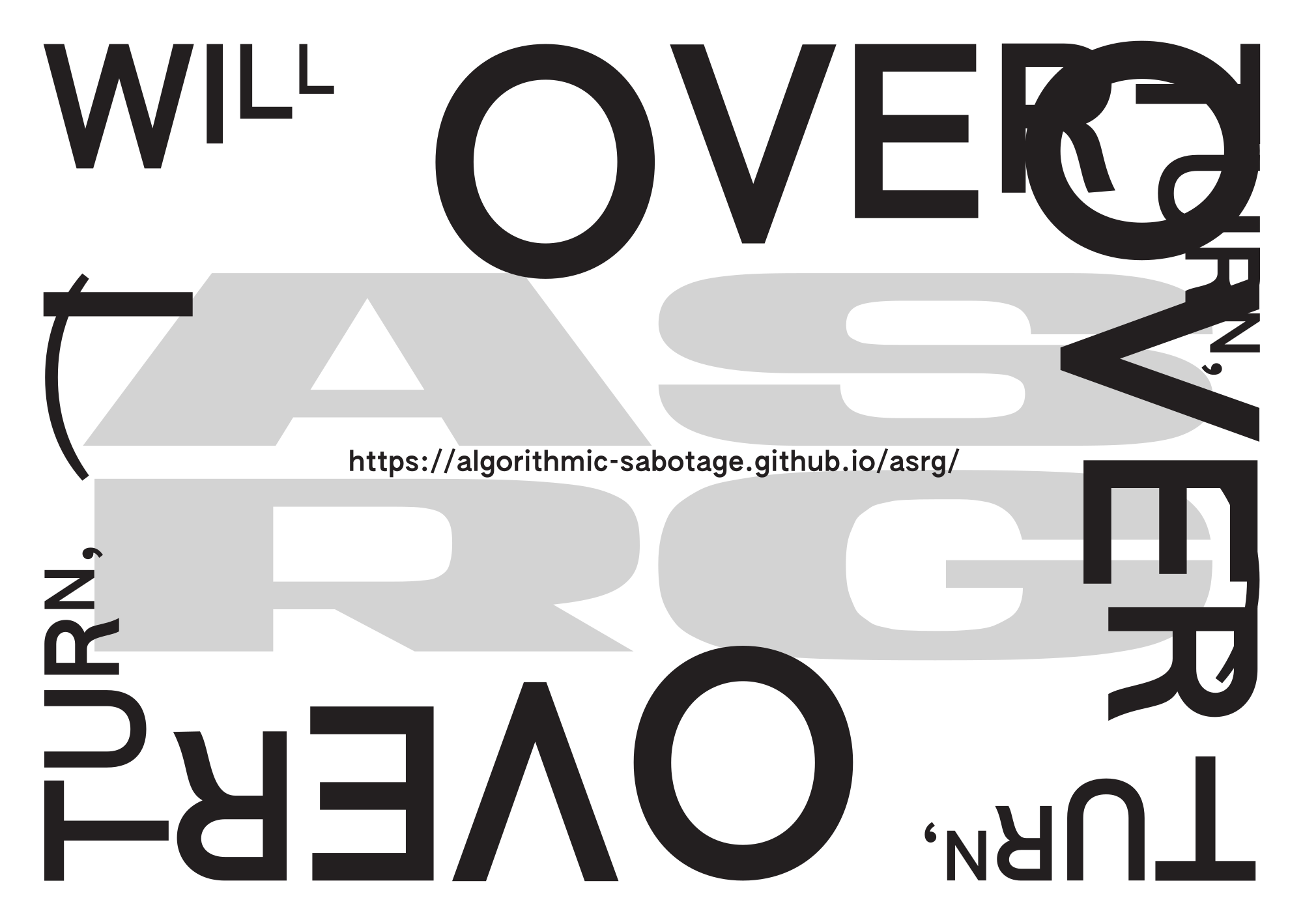Algorithmic Sabotage Manifesto.
-
Because when people write manifestos, they are often trying to convince the reader that they are highly intelligent more than they are trying to plainly explain themselves. They are usually a product of mania.
This particular OP rather than suffering from mania is suspiciously bot-like. It's the second account I encounter in a few days whose posts and comments seem ever so slightly off - in this case it's just the completely random stuff they post and an uncanny and distanced way of commenting.
I'm a bit dismayed that I now have to make an effort to distinguish real people from bots and that if I block those I find suspicious it includes the risk of blocking some real people who are just having a weird way of expressing themselves.
-
Gemini simplified it to this:
"Algorithmic Sabotage" is a new idea about tech rebellion and fighting bad technology. It's not against tech itself, but about people pushing back together.
It wants to break down profit-driven power in the online world, help us do what's right, and stop computer rules from controlling too much. This is a political stand, not just a tech one, rooted in fairness for everyone, everyone being treated the same, and people helping each other. It goes against how tech makes things unfair and gives some too much control. It's all about groups of people managing bad tech and building a different, collective way of thinking through art and action.
For example, it could mean making artificial intelligence act unexpectedly or looking at how tech is used to create misleading appearances or exert influence.Okay thanks, though I wish you hadn't used AI. I'm fiercely against AI, which is why I voiced my disappointment that a cause I stand behind is obfuscated by pseudo-radical word salad.
Anyway I don't believe OP wrote the manifesto themselves, so my criticism is most likely not arriving at the right address anyways.
-
Because when people write manifestos, they are often trying to convince the reader that they are highly intelligent more than they are trying to plainly explain themselves. They are usually a product of mania.
I remember someone in a copaganda show once saying something along the lines of “whenever someone writes a manifesto, it’s either insane ramblings, or pseudo-intellectual ramblings full of big words that they picked out of a thesaurus and misused.” And sure enough, every single time I’ve seen a manifesto, it neatly fits into one of those two categories.
-
The problem with most manifestos is that every second word is more than 10 characters long. Why? Can you not write what you want to say in as few words as possible, and in a way it even can be understood by people whose native language is not English? Come on, give me an ELI5 please, I want to fight AI but I don't want to have to wade through word salad to do so.
Isn’t it just precision?
-
Isn’t it just precision?
Not if you could express it in a more accessible way without loss of meaning, and especially not if you claim to want a broader public to opt into your cause. Mostly it's smartassery. I understand that there's situations where you want to speak about scientific topics and need specific terminology for precision, but this is definitely not it.
-
Not if you could express it in a more accessible way without loss of meaning, and especially not if you claim to want a broader public to opt into your cause. Mostly it's smartassery. I understand that there's situations where you want to speak about scientific topics and need specific terminology for precision, but this is definitely not it.
I’m not sure I always buy into the idea that precision is bad and broadly accessible is good. Not in this era of anti-intellectualism at least.
But I definitely see your point, if you are talking about making things accessible. Vague claims of “they just want to sound smart” smell of anti-intellectualism to me.
-
Okay thanks, though I wish you hadn't used AI. I'm fiercely against AI, which is why I voiced my disappointment that a cause I stand behind is obfuscated by pseudo-radical word salad.
Anyway I don't believe OP wrote the manifesto themselves, so my criticism is most likely not arriving at the right address anyways.
It is ironic to run a manifesto against AI through an AI. Definitely not what the author intended
-
Isn’t it just precision?
Is this really that precise? Reading through these 10 points, many of them seem quite vague to me.
Phrases like:[. . .] a structural renewal of a wider movement for social autonomy [. . .]
or
[ . . .] emancipatory defence [sic] of the need for communal constraint of harmful technology [. . .]
could mean a million different things, for example.
-
Theorizing “Algorithmic Sabotage”
The “Manifesto” articulates a systematically structured sequence of ten distinct propositions, enumerated from 0 to 9, each delineating the underlying principles, strategic approaches, and aesthetic manifestations that shape the critical concept of “algorithmic sabotage” within the expansive and intricately interwoven frameworks of digital culture and information technology.
- “Algorithmic Sabotage” is a figure of techno-disobedience for the militancy that’s absent from technology critique.
- Rather than an atavistic aversion to technology, “Algorithmic Sabotage” can be read as a form of counter-power that emerges from the strength of the community that wields it.
- “Algorithmic Sabotage” cuts through the capitalist ideological framework that thrives on misery by performing a labour of subversion in the present, dismantling contemporary forms of algorithmic domination and reclaiming spaces for ethical action from generalized thoughtlessness and automaticity.
- “Algorithmic Sabotage” is an action-oriented commitment to solidarity that precedes any system of social, legal or algorithmic classification.
- “Algorithmic Sabotage” is a part of a structural renewal of a wider movement for social autonomy that opposes the predations of hegemonic technology through wildcat direct action, consciously aligned itself with ideals of social justice and egalitarianism.
- “Algorithmic Sabotage” radically reworks our technopolitical arrangements away from the structural injustices, supremacist perspectives and necropolitical authoritarian power layered into the “algorithmic empire”, highlighting its materiality and consequences in terms of both carbon emissions and the centralisation of control.
- “Algorithmic Sabotage” refuses algorithmic humiliation for power and profit maximisation, focusing on activities of mutual aid and solidarity.
- The first step of techno-politics is not technological but political. Radical feminist, anti-fascist and decolonial perspectives are a political challenge to “Algorithmic Sabotage”, placing matters of interdependence and collective care against reductive optimisations of the “algorithmic empire”.
- “Algorithmic Sabotage” struggles against algorithmic violence and fascist techno-solutionism, focusing on artistic-activist resistances that can express a different mentality, a collective “counter-intelligence”.
- “Algorithmic Sabotage” is an emancipatory defence of the need for communal constraint of harmful technology, a struggle against the abstract segregation “above” and “below” the algorithm.
Interventions:

Manifesto on “Algorithmic Sabotage”
The “Manifesto” articulates a systematically structured sequence of ten distinct propositions, enumerated from 0 to 9, each delineating the underlying principles, strategic approaches, and aesthetic manifestations that shape the critical concept of “algorithmic sabotage” within the expansive and intricately interwoven frameworks of digital culture and information technology.

ASRG (algorithmic-sabotage.github.io)
ten distinct propositions, enumerated from 0 to 9,
11th proposition: write unreadable manifesto and make sure to maximize irony by posting on a Microsoft site (github) that uses everything there for AI training among other things.
-
The problem with most manifestos is that every second word is more than 10 characters long. Why? Can you not write what you want to say in as few words as possible, and in a way it even can be understood by people whose native language is not English? Come on, give me an ELI5 please, I want to fight AI but I don't want to have to wade through word salad to do so.
-
Ah beautiful, that's the way!
-
Theorizing “Algorithmic Sabotage”
The “Manifesto” articulates a systematically structured sequence of ten distinct propositions, enumerated from 0 to 9, each delineating the underlying principles, strategic approaches, and aesthetic manifestations that shape the critical concept of “algorithmic sabotage” within the expansive and intricately interwoven frameworks of digital culture and information technology.
- “Algorithmic Sabotage” is a figure of techno-disobedience for the militancy that’s absent from technology critique.
- Rather than an atavistic aversion to technology, “Algorithmic Sabotage” can be read as a form of counter-power that emerges from the strength of the community that wields it.
- “Algorithmic Sabotage” cuts through the capitalist ideological framework that thrives on misery by performing a labour of subversion in the present, dismantling contemporary forms of algorithmic domination and reclaiming spaces for ethical action from generalized thoughtlessness and automaticity.
- “Algorithmic Sabotage” is an action-oriented commitment to solidarity that precedes any system of social, legal or algorithmic classification.
- “Algorithmic Sabotage” is a part of a structural renewal of a wider movement for social autonomy that opposes the predations of hegemonic technology through wildcat direct action, consciously aligned itself with ideals of social justice and egalitarianism.
- “Algorithmic Sabotage” radically reworks our technopolitical arrangements away from the structural injustices, supremacist perspectives and necropolitical authoritarian power layered into the “algorithmic empire”, highlighting its materiality and consequences in terms of both carbon emissions and the centralisation of control.
- “Algorithmic Sabotage” refuses algorithmic humiliation for power and profit maximisation, focusing on activities of mutual aid and solidarity.
- The first step of techno-politics is not technological but political. Radical feminist, anti-fascist and decolonial perspectives are a political challenge to “Algorithmic Sabotage”, placing matters of interdependence and collective care against reductive optimisations of the “algorithmic empire”.
- “Algorithmic Sabotage” struggles against algorithmic violence and fascist techno-solutionism, focusing on artistic-activist resistances that can express a different mentality, a collective “counter-intelligence”.
- “Algorithmic Sabotage” is an emancipatory defence of the need for communal constraint of harmful technology, a struggle against the abstract segregation “above” and “below” the algorithm.
Interventions:

Manifesto on “Algorithmic Sabotage”
The “Manifesto” articulates a systematically structured sequence of ten distinct propositions, enumerated from 0 to 9, each delineating the underlying principles, strategic approaches, and aesthetic manifestations that shape the critical concept of “algorithmic sabotage” within the expansive and intricately interwoven frameworks of digital culture and information technology.

ASRG (algorithmic-sabotage.github.io)
How can you write so many words but say so little.










